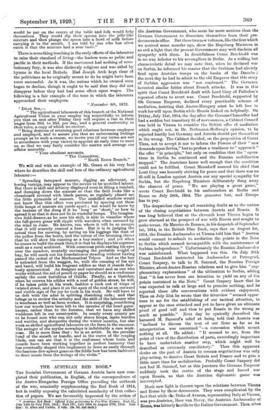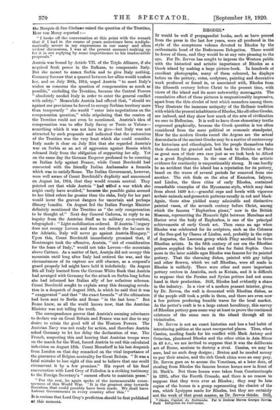THE AUSTRIAN RED BOOK.* THE Socialist Government of German Austria
have now com- pleted their publication, in English, of the correspondence of the Austro-Hungarian Foreign Office preceding the outbreak of the war, nominally supplementing the Red Book of 1914, but in reality exposing the calculated mendacity of that collec- tion of papers. We are favourably impressed by the action of
• Austrian Red Book : Official Files pertaining to Pre-War History. Part July 24th to Tidy 28th, 1914 ; Part III.. July 29th to August 27th, 1914. Lon- don : G. Allen and UnwIn. 2 vole. RA Od. net each.] the Austrian Government, who seem far more anxious than the German Government to dissociate themselves from their pre- decessors in office. But these two new volumes, like the first which we noticed some months ago, show the Hapsburg Ministers in so evil a light that the present Government may well disclaim all sympathy with them. In deceitfulness Count Berchtold was in no way inferior to his accomplices in Berlin. As a trifling but characteristic detail we may note that, when he declared war on Serbia. he informed his master that the Serbians had already fired upon Austrian troops on the banks of the Danube the next day he had to admit to the old Emperor that this story of Serbian aggression was " not confirmed." The Germans invented similar fables about French attacks. It was in this spirit that Count Berchtold dealt with Lord Grey of Fallodon's repeated efforts to avert war. Count Berchtold, supported by life German Emperor, declined every practicable scheme of mediation, insisting that Austro-Hungary must be left free to work her will upon Serbia while Russia looked on helplessly. On Friday, July 31st,1914, the day after the German Chancellor had had a sudden but transitory fit of nervousness, a Cabinet Council was held in Vienna to consider the British offer of mediation which ought not, in Dr. Bethmann-Hollweg'a opinion, to be rejected hastily lest Germany and Austria should put themselves in the wrong. The Cabinet decided, on the proposition of Count Tisza, not to accept it nor to inform the Powers of their " new demands upon Serbia," but to profess a readiness to " approach " the offer " in principle," but only on condition that the " opera- tions in Serbia be continued and the Russian mobilization stopped." The Austrians knew well enough that the condition could not be fulfilled. Count Mensdorff assured his chief that Lord Grey was honestly striving for peace and that there was no ill-will in London against Austria nor any special sympathy for Serbia, but the Hapsburg Ministers deliberately flung away the chances of peace. " We are playing a great game," wrote Count Berchtold to his ambassadors at Berlin and Rome on July 28th, 1914. The gamester lost, and Europe has to pay.
The despatches clear up all remaining doubt as to the nature of the closing negotiations between Austria and Russia. It was long believed that at the eleventh hour Vienna began to grow alarmed at the prospect of war with Russia and sought to make terms. Sir Maurice de Bunsen, in his despatch of September let, 1914, in the British Blue Book, says that on August 1st, 1914, the Russian Ambassador at Vienna told him that " Austria would consent to submit to mediation the points in the Note to Serbia which seemed incompatible with the maintenance of Serbian independence." Unfortunately the Russian Ambassador was misinformed. What happened was this. On July 30th Count Berchtold instructed his Ambassador at Petrograd, Count Szapary, to talk to M. Sazonof, the Russian Foreign Minister, about Austro-Russian relations and to give him " sup- plementary explanations " of the ultimatum to Serbia, adding that " it has never been our intention to yield on any of the points contained in the Note." Count Szapary knew that he was expected to talk at large and to promise nothing, and he reported these idle conversations with evident enjoyment, Thus on July 31st he wrote that the interview " seemed oppor- tune to me for the establishing of our tactical situation, to appear as the ones attacked and yet to have given an ultimate proof of good will and thus to put Russia in the wrong as much as possible." Next day he cynically described the harassed M. Sazonof's relief at being told that Austria was "inclined to discuss the text of our Note as far as its interpretation was concerned "—a concession which meant nothing at all. He added : " It seemed to me, from the point of view of the distribution of parts, exceedingly important to have undertaken another step, which might well be described as extremely conciliatory." Thus this apparent desire on the part of Austria to resume negotiations was only play-acting, to deceive Great Britain and Franco and to gain a little more time for mobilization. Probably Count Szapary did not fool M. Sazonof, but at this juncture the German Emperor suddenly took the centre of the stage and forced war upon Russia, so that the Austrian diplomatic game was interrupted.
Much new light is thrown upon the relations between Vienna and Rome by these documents. They were complicated by the fact that while the Duke of Avarua, representing Italy at Vienna, was pro-Austrian, Herr von Mercy, the Austrian Ambassador at Rome, was bitterly hostile to the Italian Government. Thus. when
the Marquis di San Giuliano raised the question of the Trentino, Herr von Merey reported :—
" I broke off the conversation at this point with the remark that if I had in the course of years sometimes been undiplo- matically severe in my expressions in our many and often violent discussions, I was at the present moment making up for it in not replying by some impertinence to his inadmissible proposals."
Austria was bound by Article VII. of the Triple Alliance, if she acquired fresh power in the Balkans, to compensate Italy. But she meant to annex Serbia and to give Italy nothing. Germany foresaw that a quarrel between her allies would weaken hes, and on July 30th, 1914, urged Austria " to meet Italy's wishes as concerns the question of compensation as much as possible," excluding the Trentino, because the Central Powers " absolutely needed Italy in order to enter the general conflict with safety." Meanwhile Austria had offered that, " should we against our provisions be forced to occupy Serbian territory more than temporarily " she would " enter into negotiations on the compensation question," while stipulating that the cession of the Trentino could not even be mentioned. Austria's idea of compensation was to offer Italy Savoy or Tunis or Valona- something which it was not hers to give—but Italy was not attracted by such proposals and indicated that the restoration of the Trentino was the very least which she could consider. Italy made it clear on July 31st that she regarded Austria's war on Serbia as an act of aggression against Russia which released Italy from the obligation of supporting her ally. Yet on the same day the German Emperor professed to be counting on Italian help against France, while Count Berchtold had concocted with the friendly Italian Ambassador a formula which was to satisfy Rome. The Italian Government, however, were well aware of Count Berchtold's duplicity and announced on August 1st, 1914, that they would remain neutral. They pointed out that while Austria " lmd willed a war which she might easily have avoided," because the possible gains seemed to her blind rulers far greater than the risks, Italy for her part would incur the gravest dangers for uncertain and perhaps illusory benefits. On August 3rd the Italian Foreign Minister definitely mentioned the Trentino as " the only compensation to be thought of." Next day General Cadorna, in reply to an inquiry from the Austrian Staff as to military co-operation, telegraphed : " Light mobilization ordered. If Austria-IIungary does not occupy Lovcen and does not disturb the balance in the Adriatic, Italy will never go against Austria-Hungary." Upon this, Count Berchtold immediately promised that, if Montenegro took the offensive, Austria, " out of consideration for the fears of Italy," would not take Lovcen—the mountain above Cattaro. As a matter of fact, Austria did not occupy this mountain until long after Italy had entered the war, and the circumstances of its capture are still obscure, as a corporal's guard properly led might have held it indefinitely. On August 9th all Italy learned from the German White Book that Austria had arranged with Germany for the attack on Serbia long before she had informed her Italian ally of her nefarious schemes. Count Berchtold sought to explain away this damaging revela- tion in a despatch of August 10th, in which he said that it was " exaggerated " and that " the exact formula " of the ultimatum had been sent to Berlin and Rome "in the last hour." But Rome knew, as all the world knows now, that the Austrian Minister was not telling the truth.
The correspondence proves that Austria's seeming reluctance to declare war on Great Britain and France was not duo to any desire to retain the good will of the Western Powers. The Austrian Navy was not ready for action, and therefore Austria asked Germany to let her delay the declaration of war. The French, suspecting this and hearing that Austrian troops were on the march for the West, forced Austria to end this calculated indecision on August 12th. Count Mensdorff in his last despatch from London on that day remarked on the vital importance of the guarantee of Belgian neutrality for Great Britain. " It was a fatal mistake to lose sight of this and to believe that one could circumvent it by a few promises." His report of his final conversation with Lord Grey of Fallodon is a striking testimony to the Foreign Secretary's " earnest efforts to maintain peace."
" For the rest, he again spoke of the immeasurable conse- quences of this World War. It is the greatest step towards Socialism that could possibly have been made. We shall have Labour Governments in every country after this.' "
It is curious that Lord Grey's prediction should be first published at this moment.







































 Previous page
Previous page